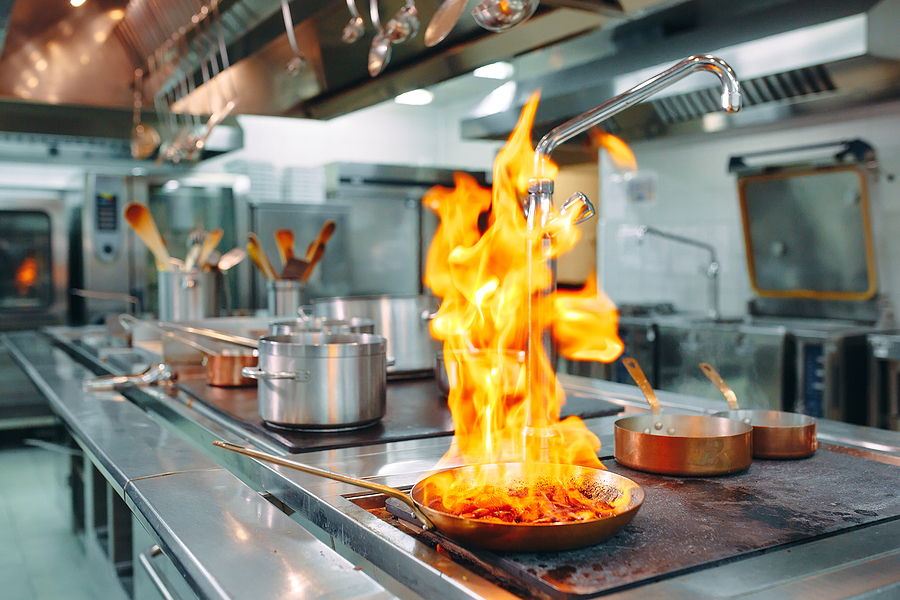Working in a busy kitchen can be chaotic, and accidents happen from time to time. But when hot oil and open flames mix, small mishaps can flare up into full-blown disasters. Let’s talk about what causes kitchen fires, how to put them out safely, and what equipment you need on hand for emergency situations.
What Sparks Grease Fires?
Grease buildup on your stove and fryers is usually the culprit. When oil gets too hot, it can start boiling, smoking, and eventually catch fire. If the cooks don’t notice the warnings signs, don’t turn down the heat, or don’t remove the oil from the burner, you’ve got a grease fire on your hands!
Things can escalate quickly from small flare-ups to major safety hazards. During the controlled chaos of dinner rush, it’s easy to lose track of what’s happening on the stove. Staying focused and attentive is key to avoiding fires.
Putting Out Grease Fires
If a grease fire breaks out:
Immediately Turn Off the Heat Source
The very first step is to turn off the stove, fryer, or any other heat source that is fueling the fire. Gas stoves will have a manual shut off valve, while electric stoves can simply be switched off. This eliminates the main factor causing the oil to combust.
Cover the Pot or Pan with a Lid
After the heat is off, place a tight-fitting lid over the pot or pan. This smothers the fire by blocking oxygen and preventing further flair ups. Use a flat lid that fully seals the top, rather than a domed cover with gaps along the edges. Metal lids conduct heat more efficiently than glass or ceramic materials. Carefully slide rather than place the lid directly downwards so burning oil does not splash out.
Use Baking Soda on Small Flames
For a small grease fire confined to a pot or pan, baking soda can work very effectively after covering with a lid. Maintain the lid’s position while carefully pouring 1-2 heaping spoonfuls of baking soda directly over the flames. The bicarbonate reacts with the fatty acids in the oil, removing heat and forming water and carbon dioxide to extinguish the fire. The lid contains the reaction and prevents hot splatters.
Use a Commercial Fire Extinguisher for Larger Fires
If the flames have spread beyond the cooking vessel or don’t die out after applying baking soda, it is crucial to utilize a commercial kitchen fire extinguisher labeled and rated for Class K fires. These are specially designed to combat burning vegetable oils, animal fats, and other hot greases.
Common Mistakes That Make Fires Worse
In the panic of the moment, it’s easy to forget proper fire safety techniques. Here are some bad ideas that you should avoid at all costs:
- Splashing water on the blaze can cause burning oil to slosh out of the pot and spread the fire rapidly.
- Tossing flour or baking powder seems like a logical move. But with all the heat and oxygen exposure, these powdery substances can ignite easily too.
- People often confuse baking soda and baking powder. But baking powder contains additional acidic ingredients that adversely react with grease fires.
What about Class K Fire?
Restaurant kitchens see a specific kind of blaze known as Class K fires. These are fueled by all those tasty frying oils that can ignite readily under high heat. When vegetable oils, animal fats, or other cooking greases catch fire, they burn fast and furiously. The extremely high temperatures make them difficult to contain and extinguish.
Anytime the cooks are working with flammable liquids, extra vigilance is a must. Keep a close eye on fryers and woks to spot any smoke or boiling that precedes an oil fire. It also helps to have the right gear close at hand specifically designed for these types of infernos.
Class K Fire Extinguisher
Class K fire extinguishers contain specialized potassium-based agents for fighting restaurant grease fires. When deployed onto burning oils, these wet chemical mixtures release heat-absorbing vapors.
This helps cool the oils below their auto-ignition point until the fire is suppressed. The compounds also coat the oils to separate them from oxygen. This smothering effect chokes off the fire so it can no longer continue burning.
Never try substituting with water or regular extinguishers when dealing with hot oils and deep fryers. Even more, regular dry chemical extinguishers don’t have the same neutralizing impact on animal or vegetable oil fires. Having these specialty extinguishers on hand and knowing when and how to operate them keeps your staff and restaurant protected!
